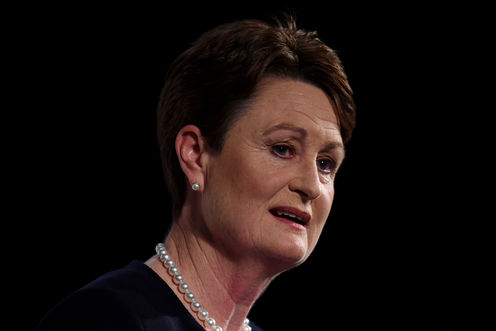
Australia needs new “philosophical underpinnings” for the major spending areas of health, education and retirement income, Business Council of Australia President Catherine Livingstone has said.
The model of political leadership also needs to be reframed, because it is “so obviously struggling” at the moment, she told the National Press Club on Wednesday.
Livingstone said the approach in health should change from one of “fixing people when they are sick” to enabling them to stay healthy as long as possible.
“Put bluntly, the focus needs to shift from the second 50 years of life to the first 50 years – that is, preventing the things that are preventable and preserving constrained resources for those which are not.”
She gave the example of emerging research into the microbiome – 1.5 kilograms of flora predominately in the gut. This suggested “that the first 1000 days of life are even more determinant than we realised in terms of genetic expression, a robust immune system, and lifetime avoidance of conditions such as arthritis and obesity”.
Scientific advances allowing prevention and protection could be applied in conjunction with technologies empowering consumers to take control of their health from early on.
“This means we need to move the system from a transactional fee for service model to a fee for outcome model that offers providers the incentives to keep people well as part of a more shared responsibility model for health,” Livingstone said.
“We must shift our philosophy from a provider and institution driven system, to a person or customer driven system.” This would facilitate a conversation as a community about trade-offs to accommodate increased health spending.
In education the thinking must move away from the notion that work is something begun after a long period of study, to one where work is integrated with learning, she said.
“Here, the philosophic shift is to move from a system which has a rigid discontinuity between education and work, to one which is more of a continuum, enabling simultaneous engagement in education and work for all from year 11.”
Livingstone said the discontinuity between education and work was perhaps more relevant when formal education for most ended at age 15, with only a small proportion of people going to university, and degrees being three years.
“It is not helpful now, with over 30% of students at university and degrees of four and five years.
“Given that the late teens and early twenties is a period of very high innovative thinking capacity, not to have these young people participating in the workplace in some way is a waste of intellectual capital and a loss of productive capacity.”
She also pointed to the need to close the increasing gap between the digital literacy of young Australians and that of competitor nations – essential to tackling structural youth unemployment.
To achieve the needed shifts “our national preoccupation with class sizes needs to be replaced with a national obsession with teacher quality, teaching standards, learning methods and curriculum”.
Livingstone said the concept of retirement required rethinking.
It had moved from being seen as a brief interregnum between finishing work and dying, to a reward for a lifetime of hard work, to now being “often planned as an entitlement to an extended phase of life marked by a focus on leisure, and underwritten by access to the aged pension”.
But entrenching the concept of retirement had created an artificial discontinuity between work and the mature phase of life and compounded the problem by extending what was designed as a financial safety net to a broader entitlement, Livingstone said.
A paradigm shift was needed to think “about people working longer and training later in their life as the types of jobs available, and the type of work they can do, change”.
The government’s role would be to provide a safety net “but more importantly to assist people to become, and stay, independent by fully participating in the economy”.
Livingstone said that in the first instance leadership in the philosophical shifts must come from our elected representatives including the opposition, minor parties and independents “who are all part of our governance structure.
“The role of these representatives is to provide leadership, not to be re-elected.”
The political leaders “must lead the conversation on where we need to adapt through a new social contract, and they must frame the transition path over the next decade”.
“Before we talked about new philosophical bases for major policy areas and a new social contract, confidence must be restored in governance.
“From the government of the day, there needs to be evidence of respect for process, particularly the cabinet process and of the rigorous review of, and community consultation over, policy changes, and then action within.
“From those elected representatives not part of the government of the day, there needs to be constructive debate and probing of policies.
“But no one has given the opposition, minor parties and independents the mandate to obstruct,” she said.
“Above all, we need to see that the personal priorities and values of our elected representatives are congruent with what is truly in the national interest, not in their personal interest in being re-elected.”
Michelle Grattan does not work for, consult to, own shares in or receive funding from any company or organisation that would benefit from this article, and has no relevant affiliations.
